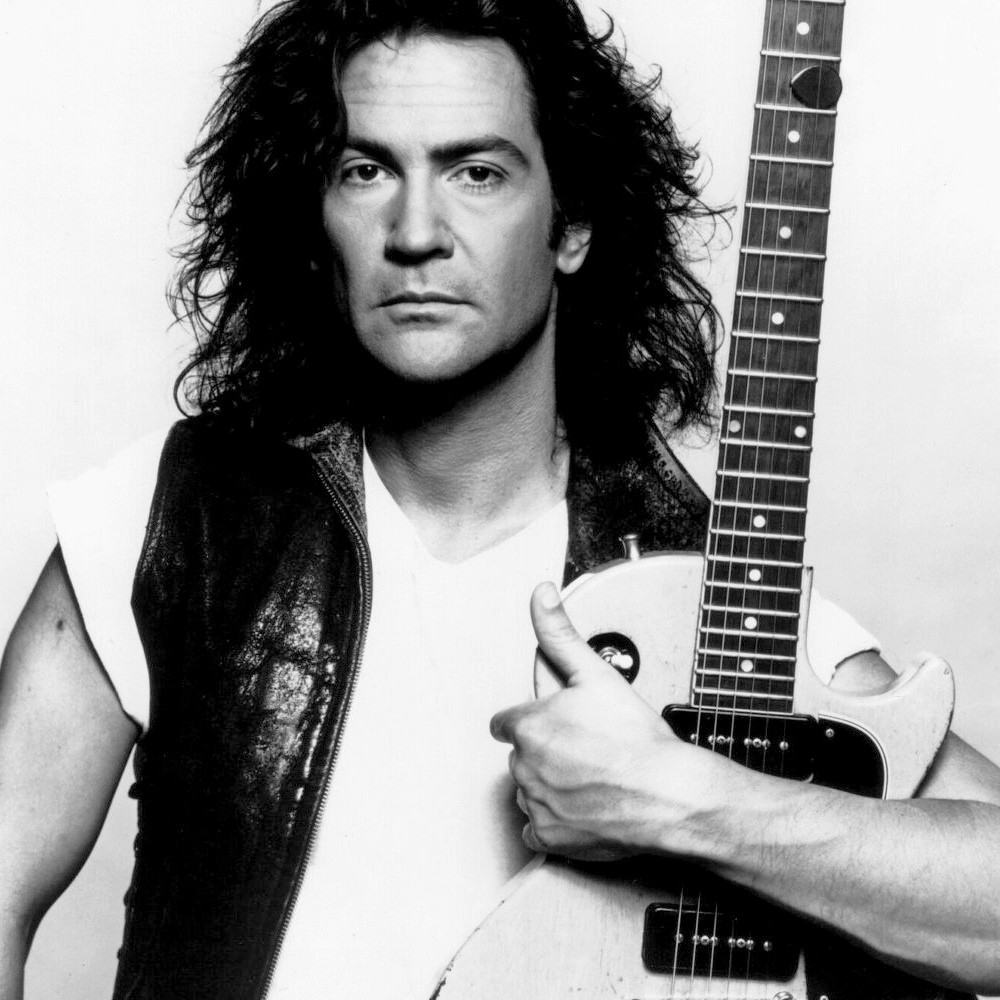For anyone who ever turned up the radio dial to hear a powerful guitar riff or a voice that just soared, the name Billy Squier probably brings back a rush of memories. You know, those songs that just stick with you, the ones that had a way of getting into your head and making you want to move. His music, you see, really shaped a good chunk of the rock sound that defined an era, leaving a mark that, in a way, still resonates with listeners today. He was, you could say, a true force, a musician who crafted tunes that were both catchy and full of a certain kind of raw energy.
Think about it, those anthems, the ones that just felt so big and so alive. Billy Squier, with his distinct sound, created a whole bunch of them, tunes that somehow captured the spirit of a time when rock music was, well, just really taking off in a big way. His work, you know, had this particular kind of spark, a blend of driving rhythms and memorable melodies that really connected with people. It wasn't just noise; it was music that had a definite purpose, something that got you excited.
So, if you've ever wondered about the person behind those tracks, the artist who gave us so many moments of pure rock enjoyment, then you're in for a bit of a treat. We're going to take a closer look at the path of Billy Squier, exploring the sounds and the stories that made him such a significant presence in music. It's about recognizing the lasting contribution of someone whose creative output continues to inspire and entertain, more or less, generations of fans.
Table of Contents
- Who is Billy Squier - The Artist Behind the Hits?
- Early Sounds and the Rise of Billy Squier
- What Makes Billy Squier's Music Stand Out?
- The Unmistakable Style of Billy Squier
- Personal Details of Billy Squier
- How Did Billy Squier Influence Rock Music?
- Billy Squier's Lasting Footprint
- Where Can You Still Hear Billy Squier's Work?
Who is Billy Squier - The Artist Behind the Hits?
Billy Squier, a name that just sort of rolls off the tongue when you're talking about rock music from the late 1970s and early 1980s, was born William Haislip Squier. He came into the world in Wellesley, Massachusetts, back in 1950. From a fairly young age, it was pretty clear that music was going to be a big part of his life. He picked up the guitar, and, you know, something just clicked. He started playing in various local groups, just getting a feel for what it was like to be on stage and create sounds for people. These early experiences, in a way, really shaped the musician he would become, giving him a solid foundation for what was to come. He spent a good amount of time honing his craft, practicing and performing, more or less, wherever he could. It was a time of learning, of trying out different sounds and seeing what truly resonated with him as an artist. This period of his life, you could say, was all about figuring out his own voice in the big world of music.
Before he became a household name as a solo artist, Billy Squier was actually part of a few different bands. One of the more notable ones was Piper, a group that put out a couple of albums in the mid-1970s. They had a bit of a following, and it was through these groups that Squier really started to develop his songwriting chops and his stage presence. He was, as a matter of fact, always trying to push himself, to get better at writing songs that had a real impact. The experience of working with other musicians in a band setting gave him a pretty good sense of how to put together a cohesive sound, something that would definitely serve him well later on. It was during these years that he began to realize that he had a unique vision for music, one that he felt he could best express on his own terms. So, it was almost like a natural progression for him to eventually step out on his own, to see what kind of musical statement he could make as a single artist.
Early Sounds and the Rise of Billy Squier
The path to becoming a solo star for Billy Squier really started to take shape after his time with Piper. He signed a record deal and, in 1980, released his first solo album, called "The Tale of the Tape." This record, you know, gave people a pretty good idea of what he was all about. It had that driving rock sound, along with his distinct way of singing and playing the guitar. While it might not have been a massive hit right away, it definitely showed a lot of promise and got some people paying attention. It was, basically, his introduction to a wider audience, a chance for him to put his own musical ideas out there without compromise. He was, to be honest, just getting started, laying the groundwork for what would become a truly memorable career in rock music. The songs on that first album had a certain raw energy, a kind of straightforward rock appeal that, in some respects, felt fresh and exciting at the time. It was clear, even then, that he had a knack for creating tunes that got stuck in your head.
Then came "Don't Say No" in 1981, and that's when things really took off for Billy Squier. This album, well, it was a smash. It featured some of his most recognized songs, like "The Stroke," "My Kinda Lover," and "In the Dark." These tracks were just everywhere, on the radio, on MTV, and they helped him become a huge name in rock music. The sound was big, the hooks were memorable, and his performances were, frankly, captivating. It was the kind of album that defined an era, a true moment where everything just seemed to align for an artist. People were really drawn to the energy and the straightforward honesty in his music. He managed to capture a certain feeling, a kind of rebellious spirit that resonated with so many listeners. The success of "Don't Say No" meant that Billy Squier was, for a time, one of the biggest rock stars around, playing to packed venues and having his songs become anthems for a generation of music lovers.
What Makes Billy Squier's Music Stand Out?
So, what was it about Billy Squier's music that made it so special, that made it connect with so many listeners? Well, for one thing, there was his voice. He had a really strong, clear singing style, one that could go from a kind of gritty growl to a smooth, melodic delivery. It wasn't just about hitting the notes; it was about the feeling he put into every word. His vocal presence, you know, was a big part of his appeal, giving his songs a distinct character. Then there's his guitar playing. He wasn't necessarily a flashy shredder, but his riffs were incredibly effective and memorable. They were the kind of guitar parts that you could hum along to, that stuck with you long after the song was over. He knew how to build a song around a powerful guitar line, making it feel just right. This combination of a unique voice and compelling guitar work really set him apart from a lot of other rock artists of his time. It was, in a way, a perfect blend of melody and muscle, something that truly spoke to rock fans.
Another thing that made Billy Squier's music stand out was his knack for songwriting. He had a way of crafting songs that felt both personal and universal. He wrote about things that people could relate to, like ambition, relationships, and the ups and downs of life. His lyrics were often direct, but they also had a certain poetic quality to them. He knew how to tell a story within a three or four-minute song, making each one feel like a complete thought. And the arrangements, well, they were always just right. The songs had a great sense of dynamics, building from quieter moments to big, powerful choruses. This careful attention to how a song was put together, from the words to the instruments, meant that his music had a real sense of purpose and direction. He was, basically, a master at creating songs that were not only catchy but also had a good amount of substance to them, which, in some respects, is why they've held up so well over time.
The Unmistakable Style of Billy Squier
When you hear a Billy Squier song, there's a pretty good chance you know it's him almost immediately. That's because he had a sound that was, you know, truly his own. It was a mix of hard rock energy with a definite pop sensibility, meaning his songs were heavy enough for rock fans but catchy enough to get played on pop radio. The drums often had a big, booming sound, the kind that made you want to tap your foot or even, you know, stomp along. And the bass lines were usually pretty solid, providing a strong foundation for everything else. His use of synthesizers, too, was pretty interesting; he didn't just throw them in, but used them to add texture and a bit of a modern feel without losing that rock edge. It was a balance, really, between keeping things raw and giving them a polished finish. This unique blend of elements created a style that was, you could say, a signature for Billy Squier, something that set him apart in a pretty crowded music scene. He found a way to be both heavy and accessible, which is not an easy thing to do, as a matter of fact.
His approach to writing and performing was also a big part of his unmistakable style. He always seemed to put everything he had into his performances, whether in the studio or on stage. There was a genuine passion that came through in his music, a feeling that he truly believed in what he was doing. This authenticity, you know, resonated with fans who were looking for something real in their rock music. He wasn't trying to be anyone else; he was just being Billy Squier, and that was more than enough. The way he structured his songs, too, with those big, anthemic choruses that just exploded, was a key part of his sound. They were the kind of songs that you could sing along to at the top of your lungs, feeling every word. This consistent approach to his craft, combined with his unique musical ideas, cemented his place as an artist with a truly distinctive sound. It was, in short, a style that was all his own, something that has, in some respects, stood the test of time.
Personal Details of Billy Squier
For those curious about the person behind the music, here are some personal details about Billy Squier, giving a bit of a glimpse into the individual who created those memorable rock tunes. It's always interesting, you know, to connect the artist to the art, to see what makes them tick. While he's known for his public persona as a rock star, there's also the individual story that shapes their creative output. This information, you could say, helps paint a more complete picture of the artist known as Billy Squier.
| Detail | Information |
|---|---|
| Full Name | William Haislip Squier |
| Date of Birth | May 12, 1950 |
| Place of Birth | Wellesley, Massachusetts, USA |
| Occupation | Musician, Singer, Songwriter |
| Instruments | Vocals, Guitar, Keyboards |
| Years Active | Late 1960s – Present (with periods of less activity) |
| Genre | Hard Rock, Arena Rock, Pop Rock |
| Associated Acts | Piper, The Sidewinders |
How Did Billy Squier Influence Rock Music?
Billy Squier's impact on rock music is, well, pretty significant, even if it's not always talked about as much as some others. He arrived on the scene at a time when rock was going through some changes, and he helped define a sound that became incredibly popular. His music, you know, had a certain kind of swagger and a big, catchy feel that became a blueprint for what people started calling "arena rock." Bands that came after him, or even those around at the same time, probably took a few cues from his ability to craft songs that sounded huge and filled up big venues. He showed that you could be heavy and powerful without sacrificing melody, which was, basically, a pretty important lesson for a lot of musicians. His work, in some respects, paved the way for a lot of the mainstream rock that dominated the airwaves throughout the 1980s. He demonstrated how to create a sound that was both commercially successful and still felt authentic to the spirit of rock and roll. It was, to be honest, a really influential period for his style of music.
Beyond just the sound, Billy Squier also influenced how rock artists presented themselves. His music videos, especially for songs like "The Stroke" and "Rock Me Tonite," were widely seen and, you know, definitely left an impression. While some of them became famous for various reasons, they showed that a rock artist could have a strong visual presence that went along with their music. He was part of that first wave of artists who really embraced MTV and understood how important it was to have a visual component to your songs. This focus on the visual, combined with his distinct musical style, meant that Billy Squier was more than just a voice on the radio; he was a complete package. He helped set a standard for how rock stars would connect with their audience in a new visual age, something that, as a matter of fact, became pretty common for many artists who followed. His willingness to experiment with the medium, you could say, had a lasting effect on how music was consumed.
Billy Squier's Lasting Footprint
Even years after his biggest hits, Billy Squier's music still has a way of popping up and reminding people of its enduring appeal. You'll hear his songs, you know, in movies, on TV shows, and even in commercials. "The Stroke," for example, has been sampled by hip-hop artists, showing how his music crosses different genres and still feels relevant to new generations of creators. This kind of continued presence means that even if someone doesn't know the name Billy Squier right away, they've probably heard his music without even realizing it. His songs have just become part of the general cultural landscape, a kind of background hum that evokes a certain era of rock. It's a pretty clear sign that his compositions have a timeless quality, something that keeps them from fading away. The sheer memorability of his guitar riffs and vocal lines ensures that his work remains in circulation, a testament to the fact that good music, basically, never really goes out of style. He created something that truly resonated, and it continues to do so.
Furthermore, many musicians today, especially those who grew up listening to classic rock radio, will often mention Billy Squier as an influence. His straightforward, no-nonsense rock approach, combined with his ability to write incredibly catchy tunes, has left a mark on countless guitarists and singers. People still cover his songs, and there's a certain respect for the way he crafted his sound. He wasn't trying to be overly complex or experimental; he just wanted to make good, solid rock and


